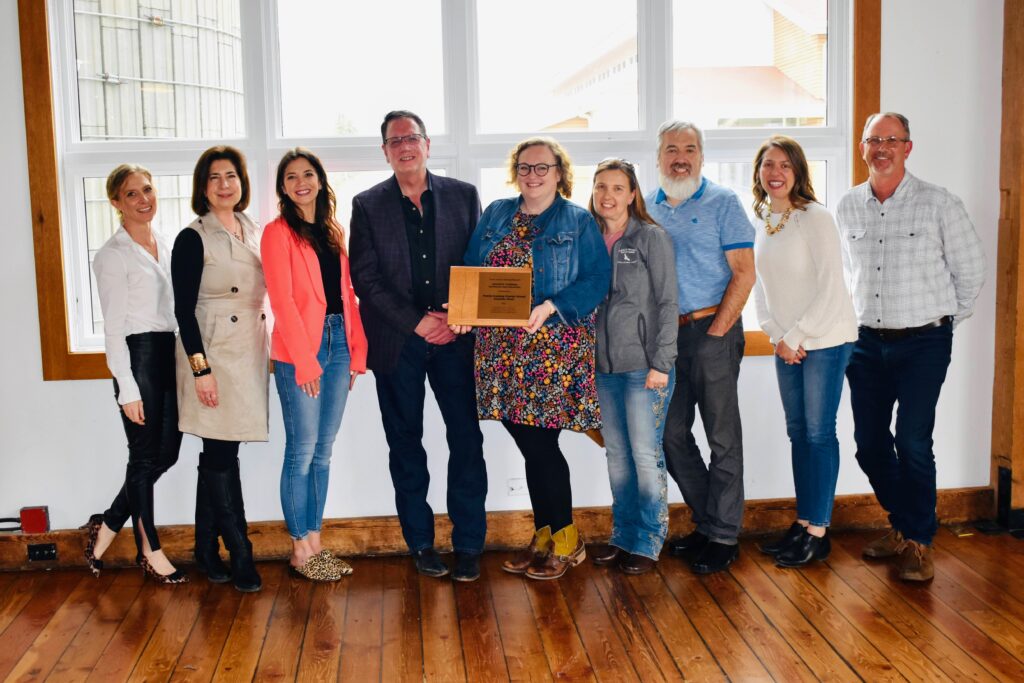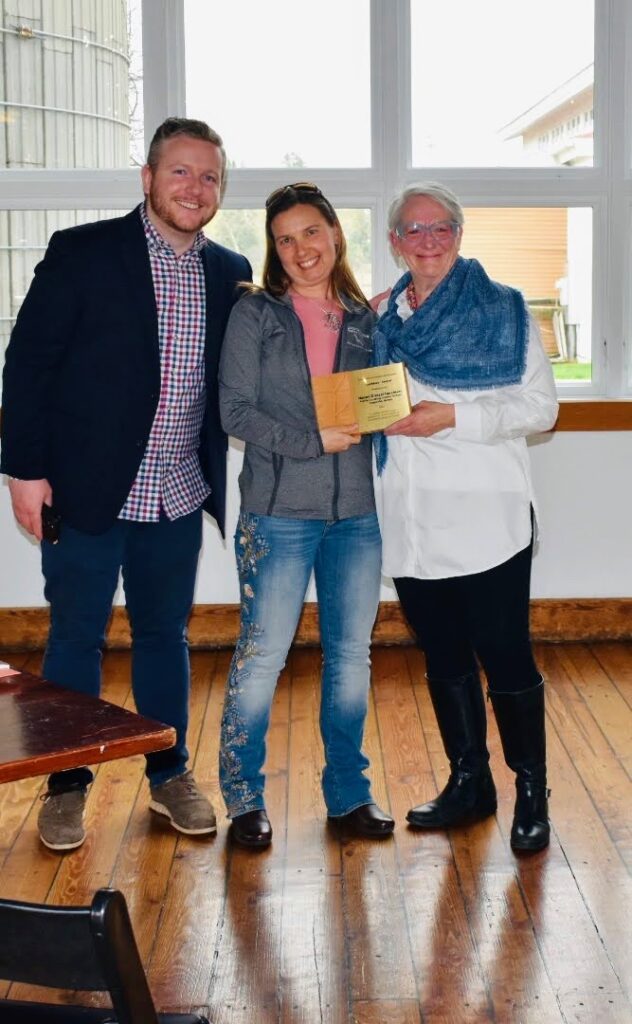
The New Award Program to Honor Leadership in Creating a Just and Sustainable Future
GRAYSLAKE, Ill. – Green Schools National Network (GSNN), a nonprofit with the mission to shape healthy, equitable, and sustainable schools, announced today the winners of the first-ever GreenPrint Trailblazer Awards.
GSNN presented the awards to Prairie Crossing Charter School (PCCS) and Naomi D. Hershiser, dean of sustainability at PCCS, at the Byron Colby Barn. Before presenting the awards, GSNN shared insights from its debut book, “Trailblazers for Whole School Sustainability: Case Studies of Educators in Action, which features PCCS.
Illinois is the first stop on a national book tour, where schools, school districts, or individual awardees will be recognized for their readiness to transform a school or district’s culture and practice, so students become changemakers, not just test-takers, who are prepared to live in and lead a sustainable future.
“These awards are an opportunity to honor innovative thinkers for their exceptional leadership and willingness to showcase how green schools are possible within the limits and structures of
our public education system,” said GSNN Executive Director Jennifer Seydel, Ph.D. “We are so proud to kick off this new award program recognizing Prairie Crossing Charter School for its outstanding display of school transformation.”
PCCS began with a passionate group of community members, led by Prairie Crossing Founder Vicky Ranney, looking to provide a choice for public education in Lake County. The opportunity arrived in 1996 when the Illinois Charter School law passed the General Assembly and was signed by Governor Jim Edgar. In 1999, Prairie Crossing Charter School was approved. Today, they remain a premier choice for public education in Lake County. They serve up to 432 students in grades kindergarten through 8th grade.
Since 2017, PCCS has displayed a persistent effort to improve its practices related to the GreenPrint Impact Systems: leadership; curriculum and instruction; climate and culture; and facilities and operations.
Leadership – The PCCS leadership team is comprised of individuals who are committed to keeping sustainability at the core of who they are and empowering students, teachers, and families to be part of the mission.
Curriculum and Instruction – Their grade level Education for Sustainability Learning Targets and P3BL Rubrics have been shared nationally as a model for this work. They are also developing a comprehensive leaders program to support SEL learning to ensure children can thrive in the outdoors.
 Climate and Culture – PCCS students experience the outdoors nearly every day. From Solo Spots and Book Buddies to entire classrooms and group projects, teachers and students engage the outdoors in their lessons and learning. On average students in all grade levels spend four times the amount of time outside compared to our neighboring schools. The results consistently rank PCCS as a top-performing school in the state. PCCS is located within the Prairie Crossing Community that was designed to combine responsible development and the preservation of open land. The school has within close proximity prairies, woodlands, wetlands, and a lake. PCCS also has a 100-acre working organic farm, Prairie Crossing Farm, which provides a demonstration of successful local food businesses and our local food systems work in action, which influences their own Sustainable School Yard initiatives and a Farm to Table program.
Climate and Culture – PCCS students experience the outdoors nearly every day. From Solo Spots and Book Buddies to entire classrooms and group projects, teachers and students engage the outdoors in their lessons and learning. On average students in all grade levels spend four times the amount of time outside compared to our neighboring schools. The results consistently rank PCCS as a top-performing school in the state. PCCS is located within the Prairie Crossing Community that was designed to combine responsible development and the preservation of open land. The school has within close proximity prairies, woodlands, wetlands, and a lake. PCCS also has a 100-acre working organic farm, Prairie Crossing Farm, which provides a demonstration of successful local food businesses and our local food systems work in action, which influences their own Sustainable School Yard initiatives and a Farm to Table program.
Facilities and Operations – PCCS was awarded a Gold Rating by The Leadership in Energy and Environmental Design (LEED) Green Building Rating System for the school’s construction and was the first LEED-rated school in Illinois. LEED is affiliated with the U.S. Green Building Council (USGBC), and its rating system is the nationally accepted benchmark for the design, construction, and operation of high-performance green buildings. Ratings are based upon six criteria: sustainable sites, water efficiency, energy and atmosphere, materials and resources, indoor environmental quality, and innovation and design process.
Naomi D. Hershiser, PCCS dean of sustainability, came to PCCS in 2003 because she believed that it is important for young people to experience nature daily and develop meaningful relationships with the earth. Hershiser has a BA from Carleton College, an environmental education certificate from the University of Minnesota Duluth, and a MAT from Dominican University. Hershiser is a lead author for a chapter in Trailblazers in Whole School Sustainability. She wrote a chapter titled ‘Places, Projects, and Problems, Oh My: An integrated approach to Sustainability Curriculum at Prairie Crossing Charter School.’ She has also worked closely with GSNN and the Biomimicry Institute on designing lessons for a K-5 curriculum and coaching teachers in the pilot.
###
Green Schools National Network (GSNN)’s mission is to shape healthy, equitable, and sustainable schools where children thrive and learn to steward the environments and communities they call home. Since 2007, GSNN has used a holistic approach in its work with schools, districts, organizations, and individual educators to transform schools from good to green. GSNN’s work is informed by its GreenPrint, a framework for transformation that covers best practices in leadership, curriculum and instruction, culture and climate, and facilities and operations. To learn more, visit greenschoolsnationalnetwork.org.
In Trailblazers for Whole School Sustainability, educators and school leaders share stories highlighting best practices and lessons learned in their pursuit of health, equity, and sustainability. The book is organized according to the four impact systems in GSNN’s GreenPrint: Leadership, Curriculum and Instruction, Culture and Climate, and Facilities and Operations. Each section of the book features four case studies that explore various aspects of these systems, from visionary leadership and culturally relevant teaching to place-based education, sustainable school food systems, and net-positive campuses. Every case study concludes with a “Learning from…” section where readers can find actionable tips, recommendations, and best practices for beginning their journey toward whole-school sustainability.
Jennifer Seydel, Ph.D., GSSN Executive Director
Jennifer Seydel brings 40 years of experience preparing youth for success in an ever-changing world as the Green Schools National Network Executive Director. She has taught at grade levels from kindergarten through graduate school, worked in public schools and nonprofits, and has been a school coach to public schools, districts, and public charter schools across the country. Seydel earned an M.Ed. in Environmental Education from Lesley College and the Audubon Expedition Institute and a Ph.D. in Environmental Studies from Antioch University of New England.
